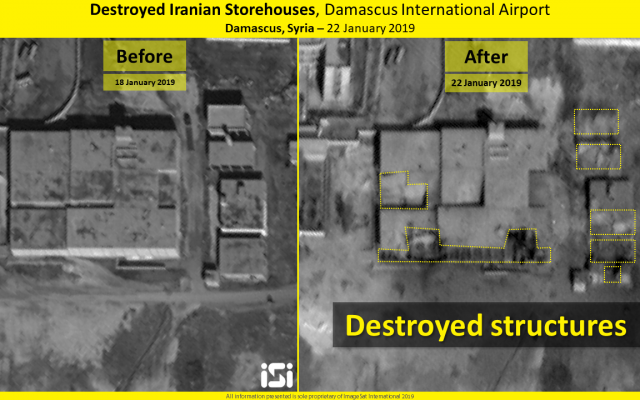Syria Threatens Ben Gurion Airport as Retaliation for Airstrikes
Syria’s envoy to the U.N. warned that if Israeli airstrikes in Syria didn’t cease, his country would retaliate with an attack on Ben Gurion International Airport outside Tel Aviv.

Bashar Jaafari, Syria’s envoy to the United Nations, warned on Jan. 23 that if Israeli airstrikes in Syria didn’t cease, his country would retaliate with an attack on Ben Gurion International Airport outside Tel Aviv.
“Isn’t it time now for the U.N. Security Council to stop the Israeli repeated aggressions on the Syrian Arab republic territories?” Jaafari asked.
Most of the airstrikes were launched Jan. 21 and 22 after an Iranian missile, fired from Syria, was intercepted over the Golan Heights. Israel has fired missiles into Syria in the past, most to stop the transfer of arms to Hezbollah and Iranian forces, but Syria does not often respond.
On Jan. 21, Israel attacked Iranian targets in Syria, which prompted Iran to launch a surface-to-air missile at the northern Golan Heights in a rare daylight missile attack. This, in turn, prompted the Israeli response hours later, on the morning of Jan. 22, targeting Iranian assets near Damascus and air defense batteries targeting the Israeli jet.
The Israel Defense Forces reported that the initial Iranian missile strike was a premeditated attack to deter Israel from striking Islamic Republic troops in Syria.
An Israeli satellite firm, ImageSat, released photos that appear to detail extensive damage at Damascus International Airport, especially to storehouses and radar systems. Among the 21 killed in the Israeli raids, 12 were reported to be members of Iran’s Islamic Revolutionary Guard Corps, six were Syrian military, and three were non-Syrian nationals.
Syrian state media quoted Jaafari as saying that if the U.N. would not intervene, “Syria would practice its legitimate right of self-defense and respond to the Israeli aggression on Damascus International Airport in the same way on Tel Aviv airport.”
Then, on the night of Jan. 24, shots were fired at Israeli soldiers posted on the Syrian border. No one was injured, but the surprising event is just another in a series of tense moments between the two nations.
Israeli troops were put on high alert in the north, and military spokesman Jonathan Conricus said that the Iranian attack was not an immediate response, but had been carefully planned out, according to IDF intelligence.
“We understand that the Iranians are trying to change the context and deter us from our policy and our strategy of fighting Iranian troops in Syria,” Conricus said. “They thought they could change the rules of engagement. Our response was a rather clear one, with a message to Iran and Syria that our policies have not changed.”
The IDF also released footage of the strikes on Syrian air defenses on Twitter.
Following Jaafari’s threats, Israel’s famous Iron Dome defense system was deployed throughout greater Tel Aviv in order to prevent a potential attack on Ben Gurion airport, a vital economic, travel and security asset for Israel.
As is common in periods of increased tension, a number of reservists from air defense units were called upon to staff the missile-defense batteries.
A day after striking the Damascus airport, Prime Minister Benjamin Netanyahu posted on his social media accounts, boasting of the “24-hour airport blitz,” causing the “renovation” of the Syrian airport.



comments